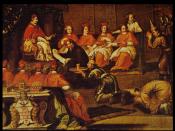I. Factors.
The Church, since its origins has suffered from the attack of heretics and their heresies which have caused many controversies and schisms within it. However, many of the conflicts are the result of other than heresies. There are cases where conflicts arose because of ambition of power, lack of moral, and intrigues, other because of lack of wisdom and a poor theological understanding.
One of the instances in which a mixture of the elements mentioned above were present was the case of the Spaniard quietist Miguel de Molinos during the XVII century. Molinos was accused by the Church with charges of heresy as well as of immoral misconduct. His main work La GuÃÂa Espiritual ('The spiritual Guide') was placed in the Index of the Church, and Molinos himself was condemned to life imprisonment, 'to be perpetually clothed in the penitential garb, to recite the Credo and one third of the Rosary, and to make confession four times every year'.
Molinos recanted publicly. His admirers said that he was behaving consistently with what he believed and taught. His accusers said that his recanting was a proof of his guilt.
What were real motives why Molinos admitted his 'guilt'? Molinos once said: 'The true quietists are always quiet, serene and eve-minded in Graces and in extraordinary favors as also in the most rigorous and bitter torments. No news causes them to rejoice, no event saddens them'. Was Miguel de Molinos trying to be consistent way with his mystical teachings of total passivity?, or was he really guilty as charged? Was Molinos a victim of the jealousy of the Jesuits? Was his fall caused by 'the machinations of a corrupt clergy who saw that they would loose their living if his plain and simple method of devotion were generally adopted'? Did...


